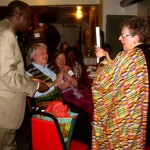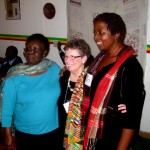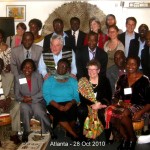2014
International Conference on Pentecostalism in Contemporary Africa
Zimbabwe Ezekiel Guti University
CALL FOR ABSTRACTS
International Conference on Pentecostalism in Contemporary Africa
Venue: Bindura, Zimbabwe,
Dates: August 7-8, 2014
Background
The Zimbabwe Ezekiel Guti University (ZEGU), a private Christian university established by a Pentecostal multi-national church movement, ZAOGA (FIF) whose niche to humanity is ‘Developing a Total Person’ has mandated the Department of Theology and Religious Studies to spearhead an inaugural international conference whose theme is ‘Pentecostalism in Contemporary Africa’. To this end the Organising Committee of the ZEGU is pleased to announce the first Call for Abstracts for a conference that will be held in Bindura, Zimbabwe from August 7-8, 2014.
Pentecostal Christianity is currently the largest renewal movement within the mainstream Christian faith that places special emphasis on the direct personal relationship with God through the baptism of the Holy Spirit. From a Pentecostal perspective, there is a ‘hot line’ between a believer and God. Like other forms of evangelical Protestantism, Pentecostalism adheres to the inerrancy of Scripture and the necessity of accepting Christ Jesus as personal Lord and Saviour. Pentecostal Christianity is distinguished by belief in the baptism with the Holy Spirit as an experience (this is separate from conversion) that enables a Christian to live a Holy Spirit-filled and empowered life. From sotereological perspectives, this empowerment includes the use of spiritual gifts such as speaking in tongues and divine healing that leads to one’s Deliverance (literally, Phuma Sathani !).
Because of their commitment to biblical authority, spiritual gifts, and miracles, Pentecostals tend to see their movement as reflecting the same kind of spiritual power and teachings that were found in the Apostolic Age of the early church during the New Testament times. There are several brands of Pentecostal churches in Africa and some use the tag such as Apostolic Church of…or Full Gospel Church of… or Church Assemblies of … or International Church of…and the like. Internationally, the Pentecostal churches have taken millions of people by ‘tremendous storm’, especially in the Third World that includes part of humanity living in Africa, Latin America and Oceania. The Conference was conceived and organized to probe why there is this perceived ‘tremendous storm?’
The Conference will present a podium for scholars, civil society, faith agencies and service providers to explore how the Pentecostal churches in Africa are aligned (or lack of it !) to deal with the critical issues, among them: the contemporary gendered/human rights abuse, human/child vulnerability, church-State relations and interreligious dialogue in the African context. The conference will specifically provide a rare platform for children themselves, for instance, the girl child, to dialogue and engage directly with the stakeholders on issues that affect (oppress?) them in society. This is in line with keeping with the human rights (notably, children’s rights or women’s rights) to be heard and taken seriously in contemporary society.
Conference objectives
The objectives of the conference are to:
• Disseminate and widen research on contemporary Christianity and Pentecostal theology in Africa
• Promote national and international ecumenical linkages on new and old Departments of religion and theology
• Promote cooperation on research among the young scholars and senior scholars in the field of religion and theology.
It is envisioned that the Conference will culminate in innovative and feasible approaches that lead to the emergence of the human values of ubuntu, justice, integrity, honesty and the re-invention (transformation) of society for the better and that it will ignite the processes towards ‘developing a total person’ for all humanity
Conference Sub-themes:
The conference has four sub-themes from which authors can choose topics to focus their abstracts on:
• Sub-theme 1: Pentecostal doctrines/beliefs/practices and African Traditional Religion
• Sub-theme 2: Pentecostalism, Human Rights and Dignity (including children, women, disabled persons and the elderly people)
• Sub-theme 3: Pentecostalism, State Relations and Pan Africanism (including land reform movements, conflict management and reconciliation initiatives)
• Sub-theme 4: Pentecostalism, Health and wellbeing (including HIV and AIDS epidemic).
Papers will be presented in English through oral and poster presentations. All papers will be peer reviewed and published.
Abstract Submission
Scholars, civic society and church leaders interested in the study of Pentecostal Christianity/Pentecostal theology are invited to submit Abstracts of not more than 350 words by 07 April 2014.
Abstracts must be clearly articulated in terms of the research question/problem statement; hypothesis; methodology; theoretical framework and major findings.
Author(s) should:
• indicate the sub theme and the mode of presentation.
• provide full name(s) of author(s), institutional affiliation, e-mail address, and
• 5-7 keywords.
Conference Fees
• Full registration: $100
• Student registration: $50
• The above fees cover the costs for breakfast, refreshments and lunch over the two days of the conference
Accommodation
• There are hotels and lodges available in close proximity of the Conference venue.
• The average overnight charge is US$50.00
Important Deadlines
• Abstract Submission Deadline: 07 April 2014
• Notification of Accepted Abstracts: 17 April 2014
• Full Paper Submission: 4 July 2014
• Early Bird Registration Commences: 2 June 2014
• Registration Ends: 7 August 2014.
For further inquiries, kindly contact Conference Organizers on the following:
zeguconferenceinfor@gmail.com
Abstracts can be submitted electronically to:
zeguconference@gmail.com
zeguconference2014@gmail.com
zeguconferenceinfor@gmail.com
2014
Obituary for Dr. Ephraim Chikakano Mandivenga
OBITUARY
EPHRAIM C. MANDIVENGA
Ephraim Chikakano Mandivenga (PhD) was born in 1937 in Gutu, Zimbabwe. He died on 5th January 2014 at South Medical Hospital in Chitungwiza, Zimbabwe. He is survived by his wife and 4 children.
Mandivenga obtained a B.A degree with distinction in 1969 from the University College of Rhodesia (UCR), then a College of the University of London. He was the first black student at the university to obtain a distinction for the degree programme, and became a subject of discussion in Parliament for his achievement in early 1970. He furthered his education and acquired an M. Phil degree in Theology and Philosophy in the early seventies. Later, he had a brief stint as a High School teacher at the Presbyterian High school in Mhondoro before being snapped by the University of Botswana where he lectured Religious Studies for a few years. He joined the Department of Theology, at the University College of Rhodesia (UCR) as a lecturer in 1977. At the attainment of Independence in Zimbabwe in 1980, he was appointed Acting Chairman of the Department until 1982.
Inspired by the late Prof. Adrian Hastings, who took over as Head of department (1982-85), Mandivenga obtained a Ph. D. degree in1987 in the field of Islamic Studies from the University of Aberdeen, Scotland. He joined the Department of Religious Studies, Classics and Philosophy at the University of Zimbabwe in 1982 as a lecturer in Islam and Introduction to Religion. He was appointed Chairman of Department for the period, 1992-1994. He retired in 2002.
As a lecturer, Mandivenga left an impressive history of excellent teaching in Islamic studies at the University. His lectures were carefully planned, well organised and precise. He was always punctual for class. As a product of one of the luminary English tertiary institutions in the United Kingdom, Aberdeen, he had a penchant for the British accent in the pronunciation of words. One of the indelible marks he left on the consciousness of his students was in the pronunciation of the Islamic declaration of faith, ‘There is only One God (Allah) and ‘Muhammad rasul Allah!’ (Prophet of Allah). He exuded great charm and his students found him quite accessible. This earned him a number of nicknames, including “Samsara” for his lectures on Hinduism.
His administrative ability is testified by his appointment as the Head of Department at the University of Zimbabwe. He was the second black African to hold this post in postcolonial Zimbabwe. In 1992 he was the Chair of Department when the University successfully hosted the International Association of the History of Religions (IAHR) Regional Conference. At one time he served as the Acting Dean of the Faculty of Arts. In the Department, he headed an international team, with members from diverse countries and backgrounds. He chaired meetings professionally and planned his work diligently. He left a legacy of democracy, participation and inclusiveness in Departmental Board meetings. His leadership is also seen in his successful recruitment of new staff in the Department that has seen the numbers swelling to the current 25 members of staff. He groomed a competitive set of scholars in his area of specialisation. Some of his products are now Professors and a good number hold PhDs in Religious Studies. Upon his retirement, he donated many books to the Religious Studies section of the Department, thereby honourably passing on the baton to the next generation of scholars. As a cheerful mentor, he endeared himself to both academic and support staff in the Department and the University.
Mandivenga’s major contribution to academia was his publication of the book, Islam in Zimbabwe (Harare: Mambo Press, 1983). In this book, he traced the historical background to the establishment of Islam in Zimbabwe. It has since become a fundamental text to the study of Islam in the country, with implications for understanding Islam in Southern Africa. His other contributions to the study of Islam can be detected in publications such as:
- “The role of Islam in Southern Africa” in C.F. Hallencreutz and M. Palmberg (eds), Religion and Politics in Southern Africa (Uppsala: Scandinavian Institute of African Studies, 1991);
- “The History and Re-conversion of the Varemba of Zimbabwe,” Journal of Religion in Africa, 19, 2 (1989), pp.98-124;
- “Islam in Tanzania: a General Survey,” in Journal of Muslim Minority Affairs, vol. 11, no. 2, 1990, pp. 311-320;
- “Muslims and the pre‐colonial history of Zimbabwe”, Journal of Muslim Minority Affairs, vol. 13, no. 1, 1992, pp. 99-115;
- A book review, “Tudor Parfitt, Journey to the Vanished City: The Search for a Lost Tribe of Israel, Journal of Religion in Africa , vol. 26, no. 2, 1996, pp. 210-212.
- ‘The Cape Muslims and the Indian Muslims of South Africa: A Comparative Analysis in Journal of Muslim Minority Affairs, vol. 20, no. 2, 2000, pp. 347-352.
Ephraim leaves a legacy of industriousness and astute scholarship that remains a heritage for the Department of Religious Studies, Classics and Philosophy at the University of Zimbabwe and the African Association for the Study of Religion community.
Inserted by
Tabona Shoko (Prof)
University of Zimbabwe
2014
The Postcolonial Church: Theology, Identity & Mission
2014
AASR Pictures from AAR and SBL Atlanta 2010
2014
AASR Student Award
The African Association for the Study of Religions (AASR) promotes the academic study of religions in Africa through the international collaboration of scholars whose research has a bearing on the subject. The Association stimulates e.g. academic conferences both in Africa and overseas. The 6th AASR conference will be held at the University of Cape Town, South Africa, from July 30-August 3, 2014. The topic of the conference is ‘Religion, Ecology and the Environment in Africa and the African Diaspora’.
On the occasion of this conference, the Association is pleased to announce the presentation of the AASR Student Award. This award honours an individual African student whose paper makes an outstanding contribution to the topic of the conference. The recipient of the AASR Student Award will receive a cash prize of $ 500. As the award will be presented during the AASR conference in Cape Town, the first prize includes a return ticket to Cape Town from any leading airport on the African continent. The recipient of the award will be invited to present the winning paper during the conference, and the paper will be published in the AASR Bulletin. The ASSR Student Award also includes a second prize, of $ 300, and a third prize of $ 200 cash.
Nominations
Nominations for the AASR Student Award must be made by May 15, 2014. Electronic submissions may be sent to Professor Gerrie ter Haar at terhaar@iss.nl. Other members of the jury are Professor Elias Bongmba, Dr Frans Dokman and Dr Rosemary Amenga-Etego.
The jury accepts nominations from students registered at African universities only. Both Phd and Master students are invited to submit a paper for consideration. The maximum length is 5000 words, including references. To facilitate the objectivity of the review process, the name of the candidate, current mailing address and phone number should appear only on the title page of any paper submitted. The winner will be notified by June 21, 2014.
In the absence of a paper deemed to merit the award, the award may be withheld.
For further information about the AASR, the Cape Town conference and the (sub)themes related to the conference topic, please visit www.a-asr.org.




